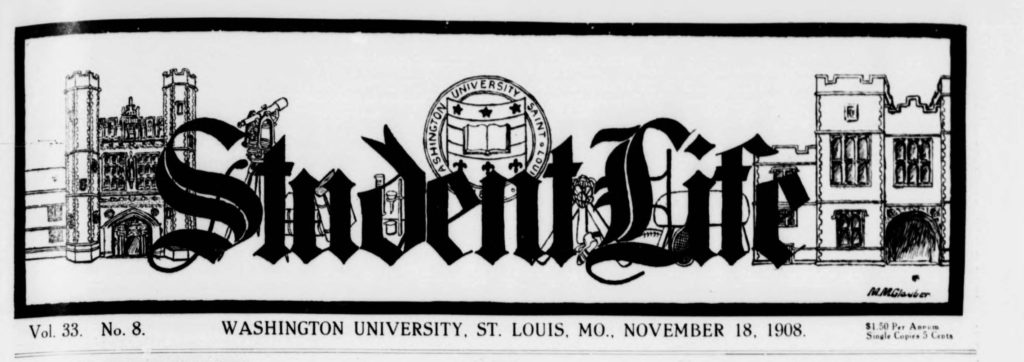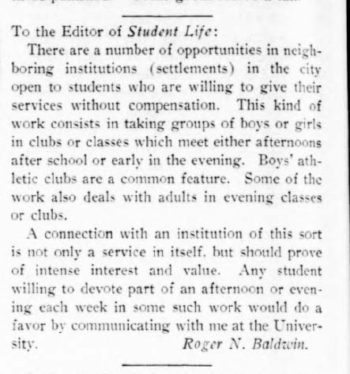
Reflections on Roger Baldwin and WashU
As an intern helping compile the ACLU of Missouri’s history, one of my tasks involved learning more about Roger Nash Baldwin and his work in St. Louis from 1906 until he left for New York City in 1917. Baldwin would use this experience in Missouri to eventually found and lead the national ACLU.
At WashU, Baldwin taught the University’s first Sociology class and was a well-respected academic. At the same time, he worked as a probation officer for St. Louis City’s new Juvenile Court, helping troubled children by providing schooling programs, activities, and assistance with the guardianship / foster system. (Baldwin himself took in two children during his time with the courts.) He worked at both the courts and the university for two years, but eventually his workload at the courts became too much and he resigned as a professor. A 1907 poem in StudLife perfectly captures Baldwin’s work ethic: “A candle burning itself at both ends; very brilliant.”
Though Baldwin stopped teaching at WashU in 1909, he would remain invested in the administration of the School of Philanthropy, a precursor to the Brown School of Social Work. Additionally, he would keep in contact with former students and colleagues, including Chancellor Eliot, and his former student and renowned playwright Fannie Hurst.
In my research, I spent time at University Archives poring over old Student Life issues to learn about Baldwin on campus. Though he was only mentioned a few times, one letter from him speaks volumes about his work at Washington University, and St. Louis in general:


“The Editor of Student Life:
There are a number of opportunities in neighboring institutions (settlements) in the city open to students who are willing to give their services without compensation. This kind of work consists in taking groups of boys or girls in clubs or classes which meet either afternoons after school or early in the evening. Boy’s athletic clubs are a common feature. Some of the work also deals with adults in evening classes or clubs.
A connection with an institution of this sort is not only a service in itself, but should prove of intense interest and value. Any student willing to devote part of an afternoon or evening each week in some such work would do a favor of communicating with me at the University.
Roger N. Baldwin.”
— Student Life, November 18, 1908, page 8.
I think Baldwin would be proud to see the plethora of student groups today which work with children in St Louis: City Faces, V.E.R.D.E., and the Campus Y to name a few. There’s always more to be done, and always ways to get involved.
Baldwin was a forward thinker who worked to improve St. Louis through municipal reform and social change, developing values which in turn shaped the ACLU for almost a century.
Jordan Dubin completed his internship with the WUSTL Libraries and the ACLU of Missouri during the fall 2018 semester.
As part of an ongoing project between the Washington University Libraries’ Julian Edison Department of Special Collections and the ACLU of Missouri, student interns are reviewing the ACLU-MO’s archived records for themes, important historic turning points, and other notable moments in the organization’s hundred-year history. The project began in 2017 and is expected to continue through the 2019-20 school year. The academic internships are open to students enrolled in any local college or university.
For more information email spec@wumail.wustl.edu or dvelazquez@aclu-mo.org.
